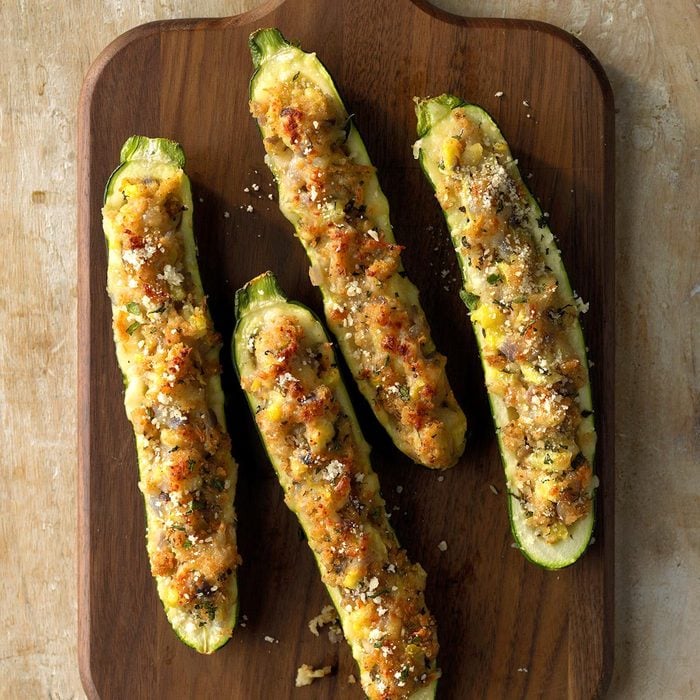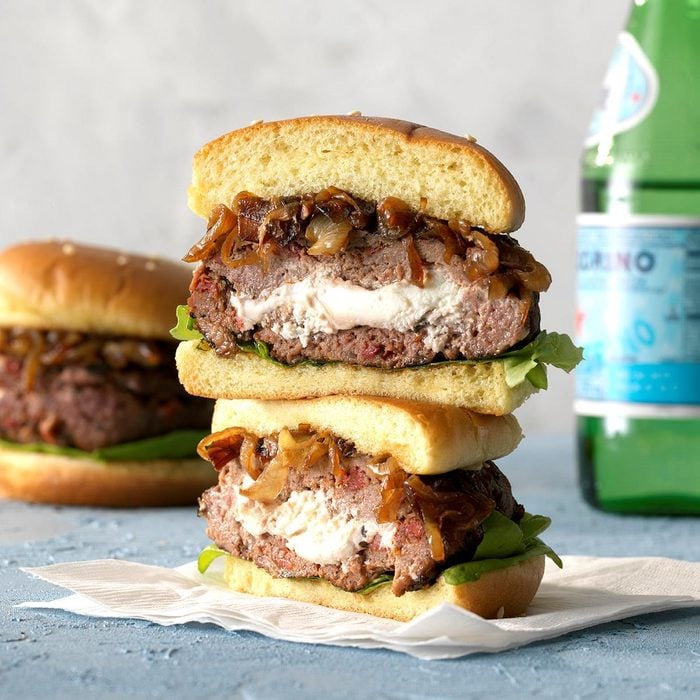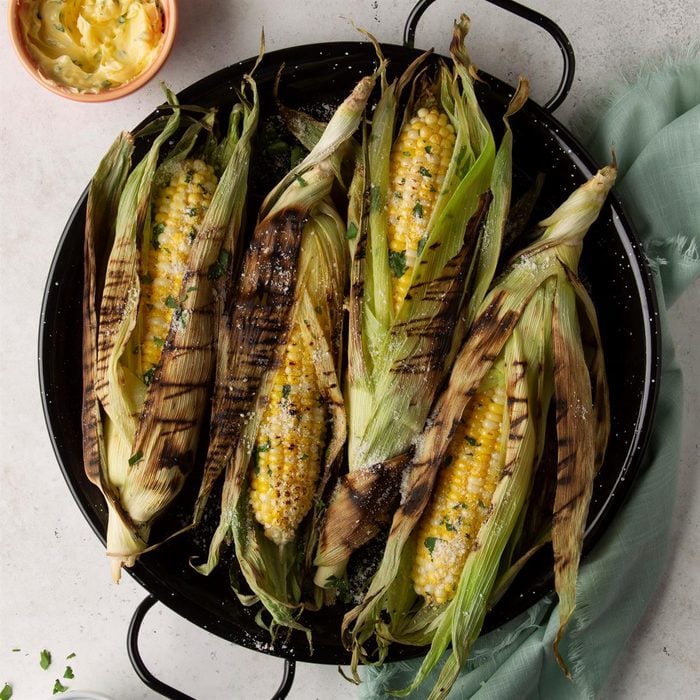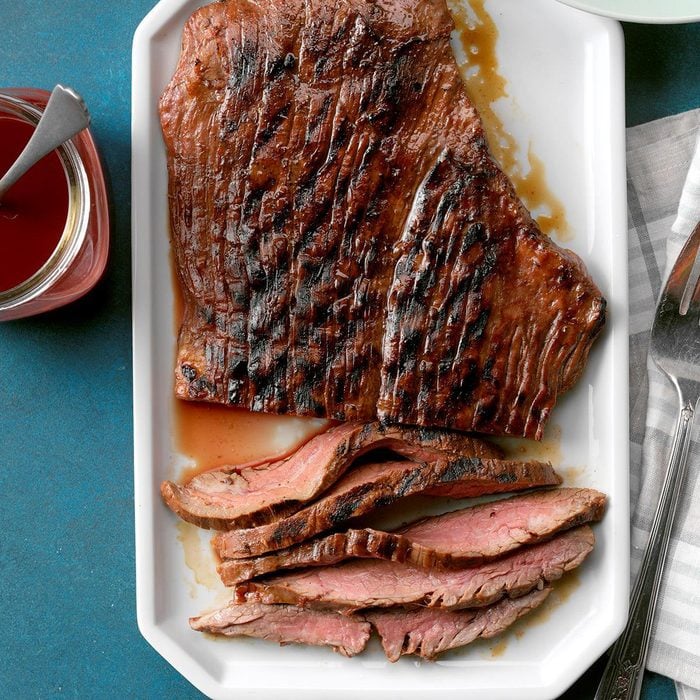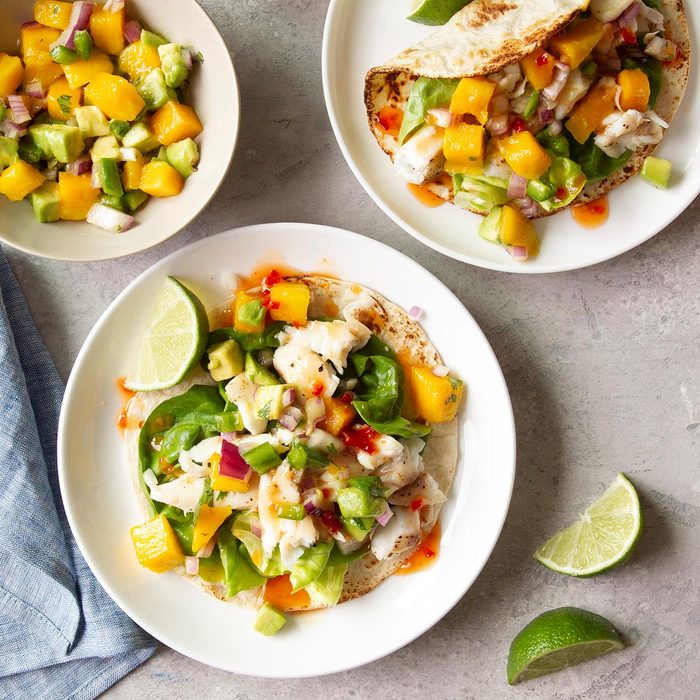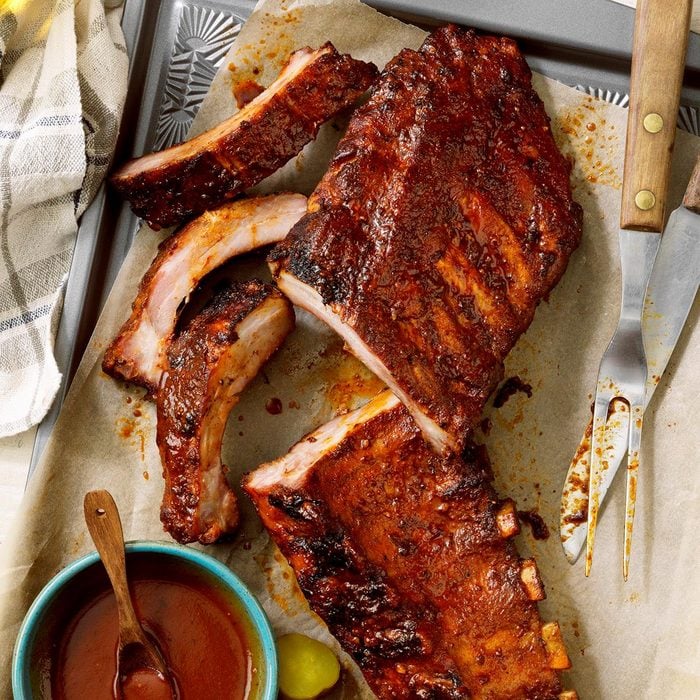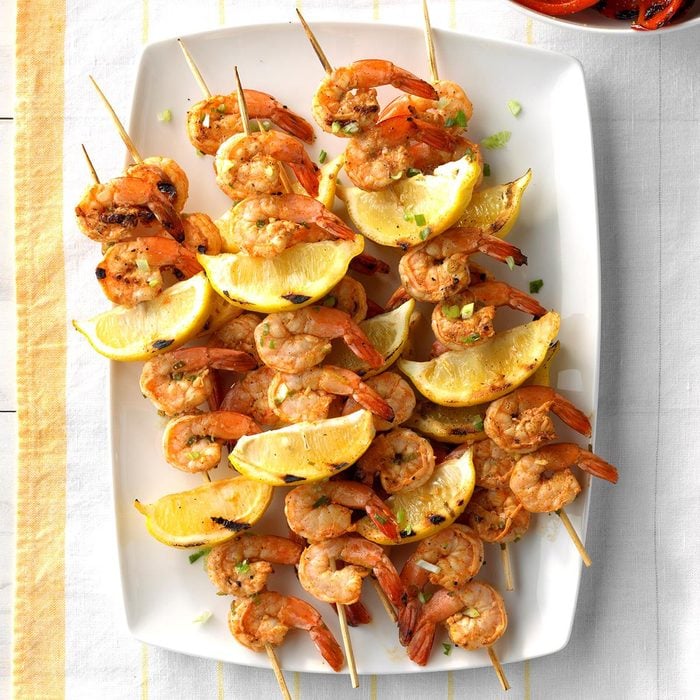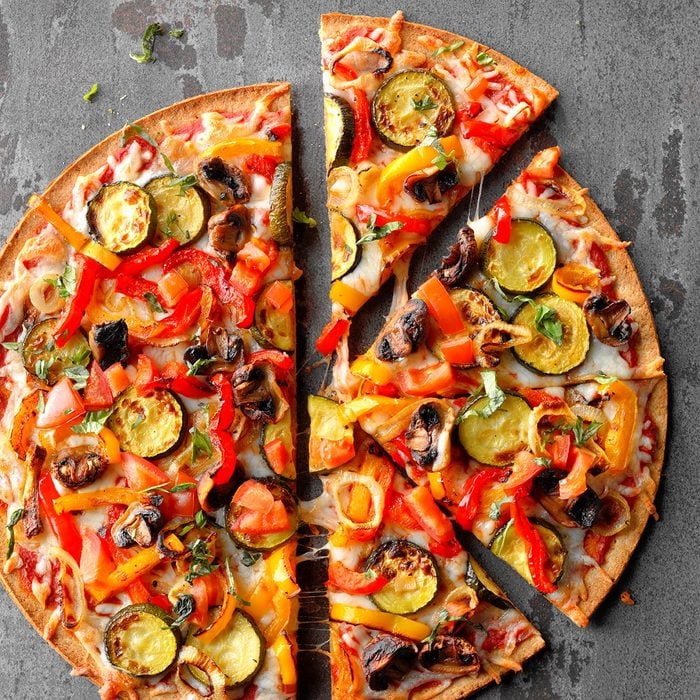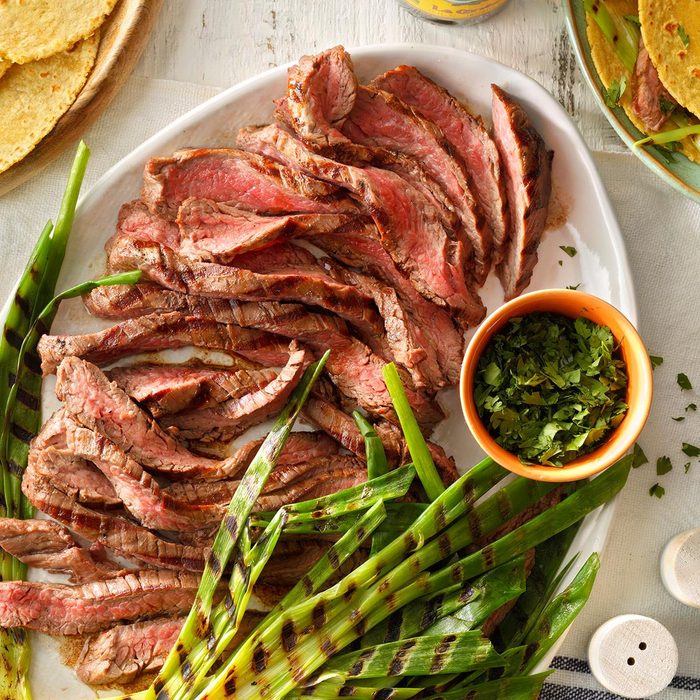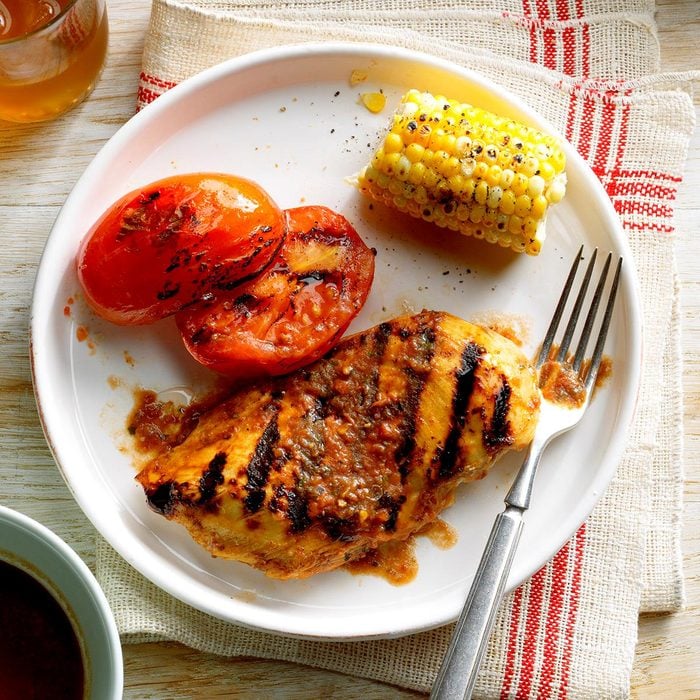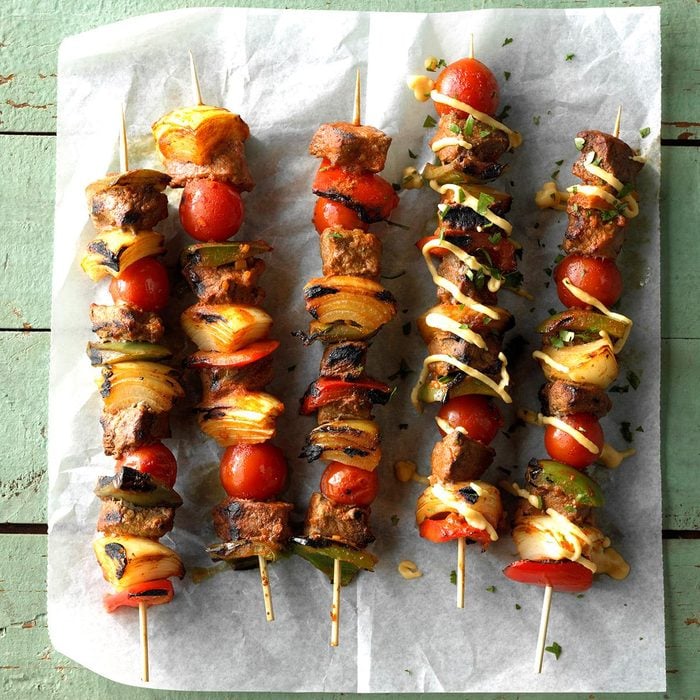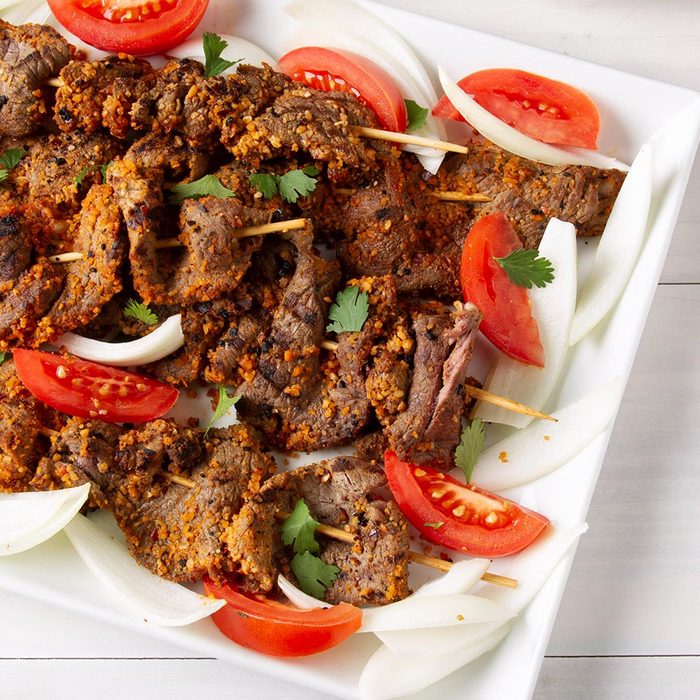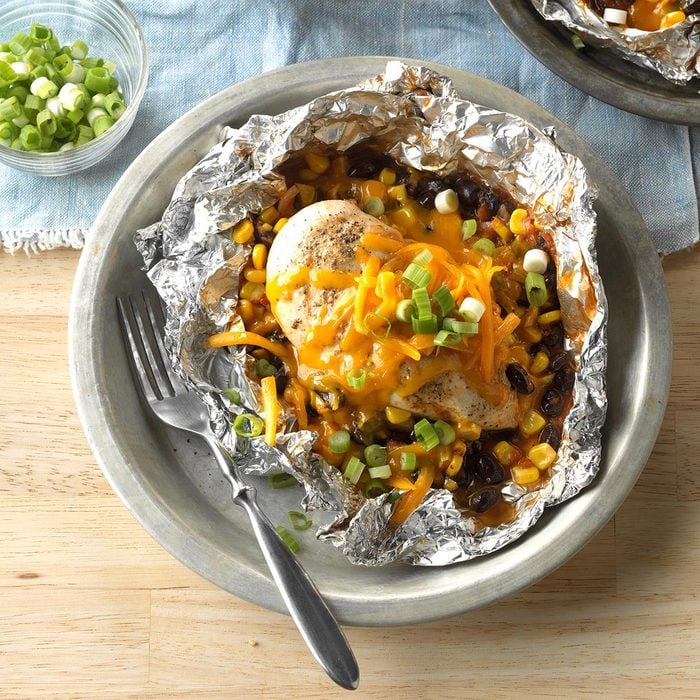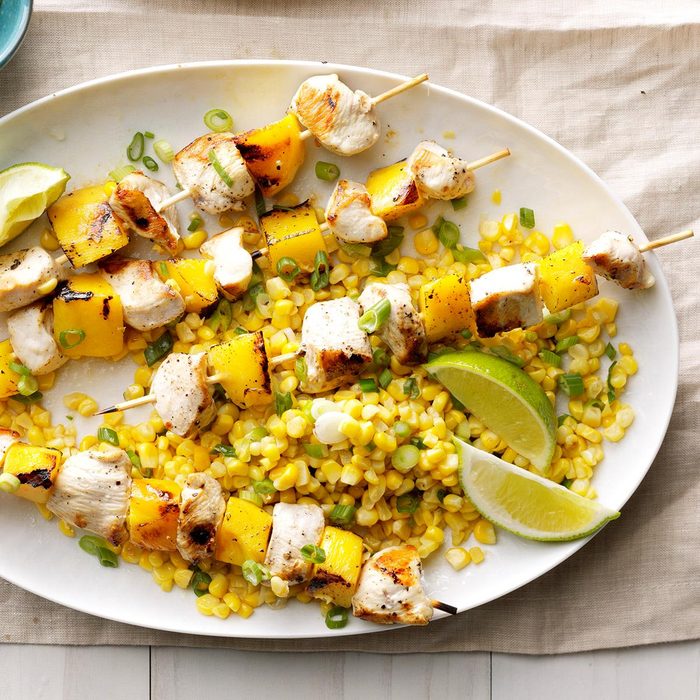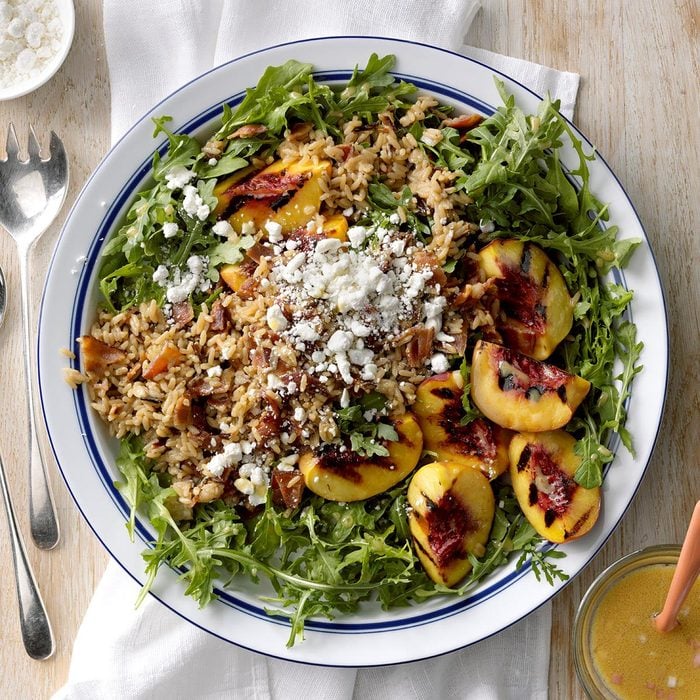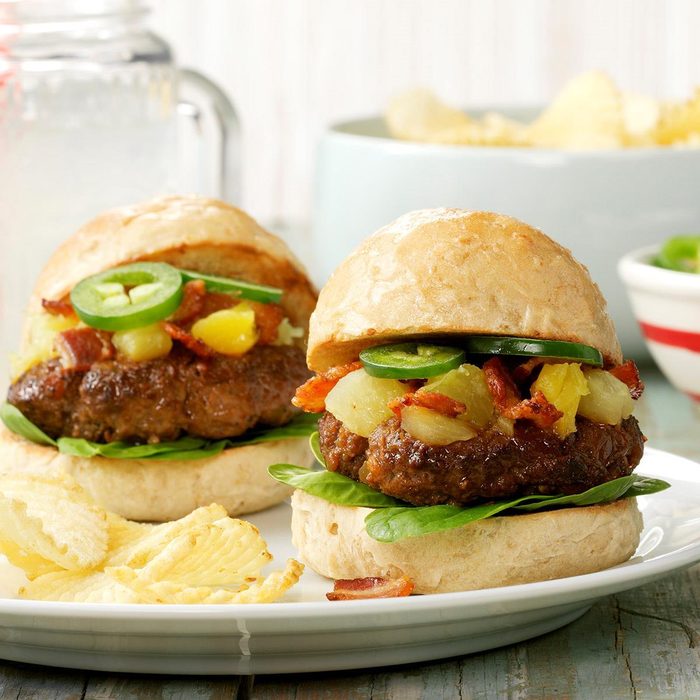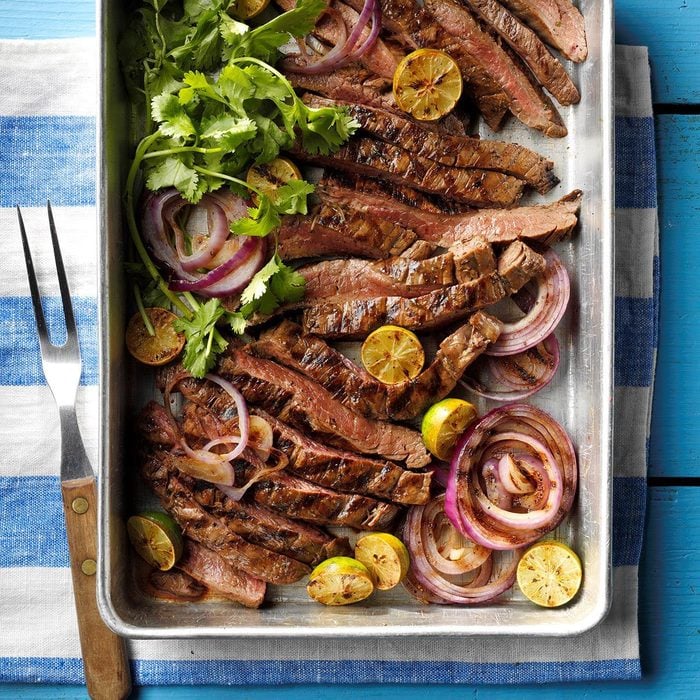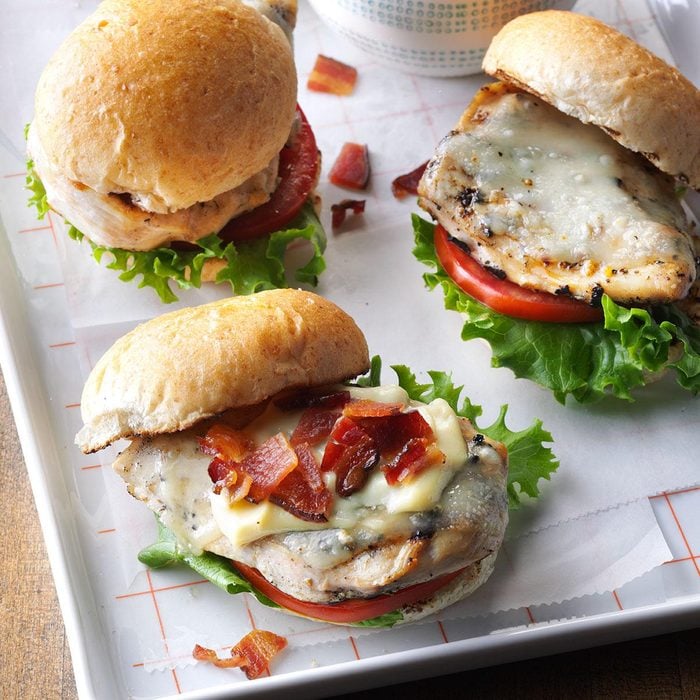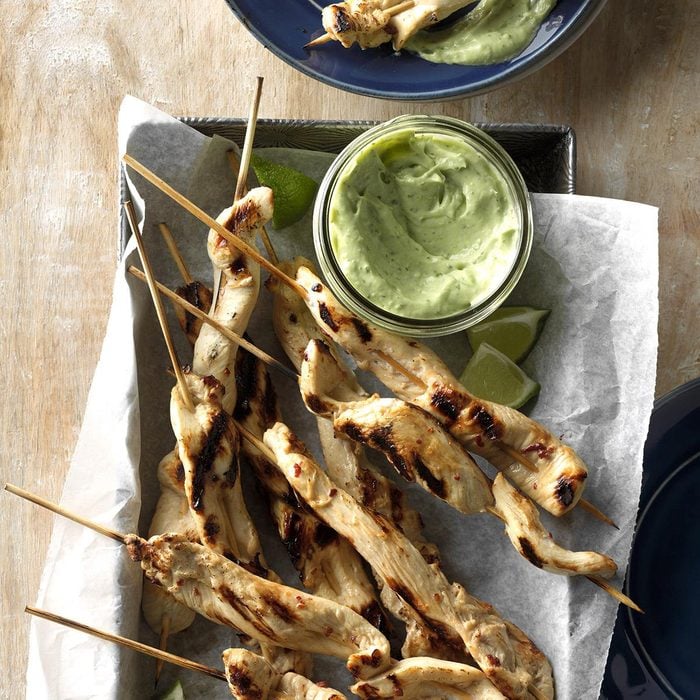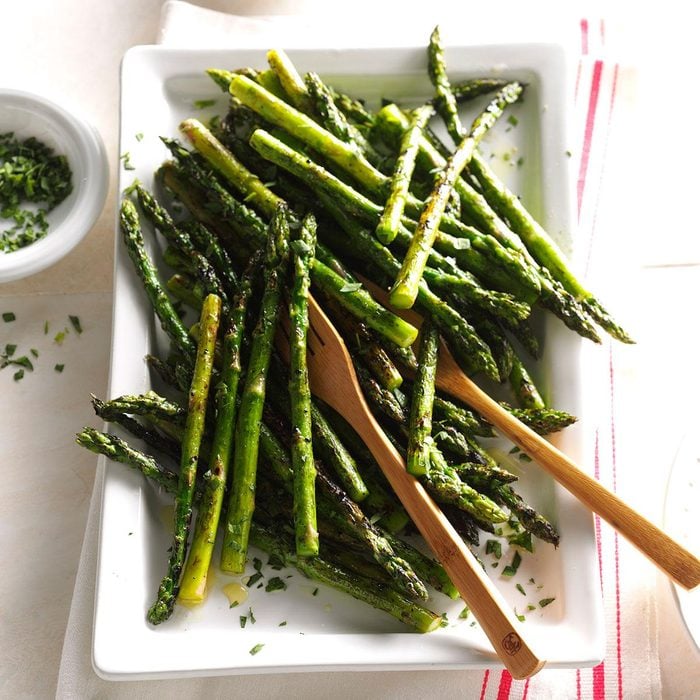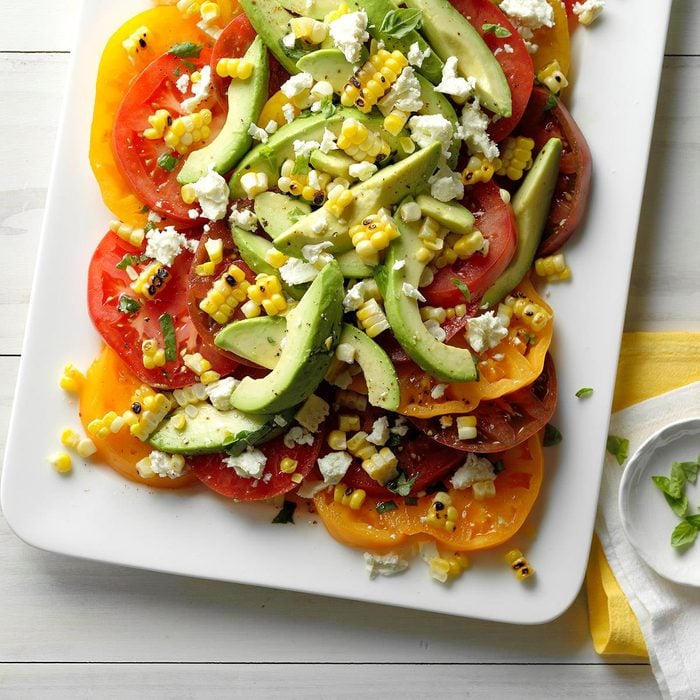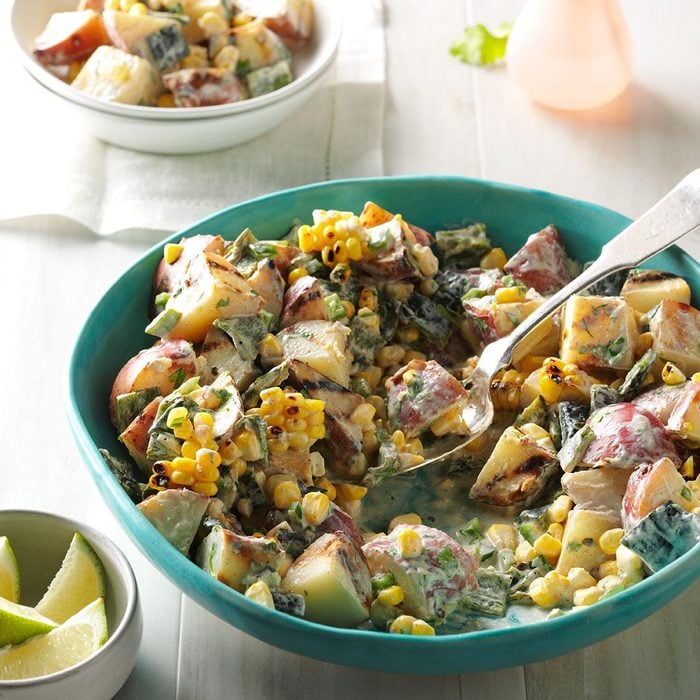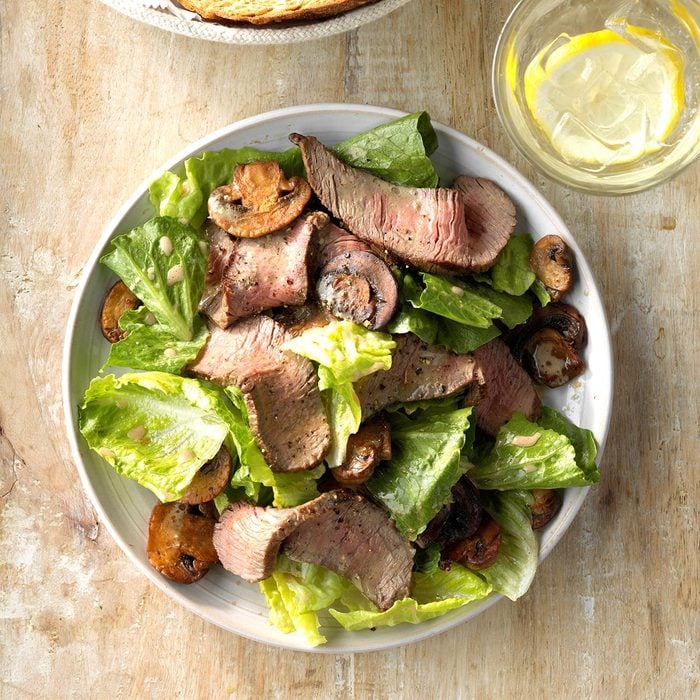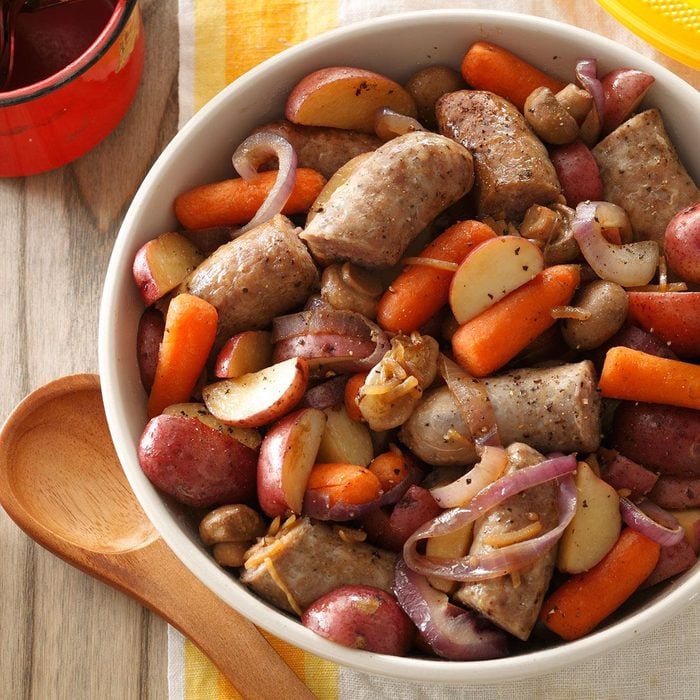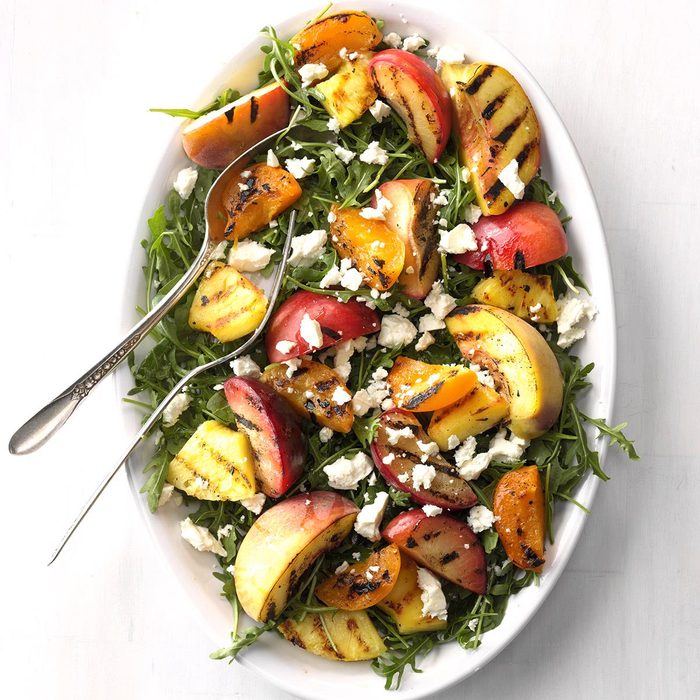Soy Marinated Flank SteakTotal Time: 25 minutes
Main Ingredients: Flank steak, soy sauce
Level: Beginner
This flavorful meat is going to be the star of your next cookout! Cutting against the grain allows for much more tender meat.
This soy-marinated flank steak is my son's favorite. I usually slice it thinly and serve it with twice-baked potatoes and a green salad to round out the meal. Leftovers are great for French dip sandwiches. —Recipe contributor Gayle Bucknam of Greenbank, Washington
Grilled Loaded Potato RoundsTotal Time: 30 minutes
Main Ingredients: Potatoes, bacon strips, sour cream, cheddar cheese
Level: Beginner
Meet your new go-to recipe for outdoor potlucks! You can top these easy potato sides with all the fixings you'd typically put on a baked potato.
My go-to recipe for outdoor potlucks is an awesome potato side. I prep everything beforehand, then assemble and grill at the party. Serve with sour cream, cheese, bacon and chives. —Recipe contributor Fay Moreland, Wichita Falls, Texas
Kentucky Grilled ChickenTotal Time: 45 minutes
Main Ingredients: Chicken breast, Worcestershire sauce, hot pepper sauce
Level: Beginner
Skip KFC in favor of Kentucky grilled chicken. The basting sauce is a simple combination of Worcestershire sauce and hot sauce that's the perfect complement to any outdoor meal.
This Kentucky grilled chicken is perfect for an outdoor summer meal, and my family thinks it's fantastic. It takes about an hour on the grill but is worth the wait. I use a new paintbrush to mop on the basting sauce. —Recipe contributor Jill Evely, Wilmore, Kentucky
Stuffed Grilled ZucchiniTotal Time: 35 minutes
Main Ingredients: Zucchini, mozzarella cheese, red onion
Level: Intermediate
These zucchini boats are stuffed with cheese, garlic, onion and bread crumbs. They're the perfect accompaniment to your favorite grilled meat.
Pair these zucchini boats with charred pork chops, smoked fish or other grilled greats. —Recipe contributor Nancy Zimmerman, Cape May Court House, New Jersey
Gourmet Burgers with Sun-Dried TomatoTotal Time: 50 minutes
Main Ingredients: Ground beef, sun-dried tomatoes, goat cheese
Level: Intermediate
The goat cheese filling in these burgers is a pleasant and refreshing surprise. In comparison to regular cheeseburgers, these really do feel gourmet.
This recipe brings together many of the flavors my family enjoys, complete with a surprise in the center of each burger. You can use almost any cheese—Gorgonzola, feta, smoked Gouda, blue or another family favorite. —Recipe contributor Aaron Shields, Hamburg, New York
Grilled Corn in HusksTotal Time: 40 minutes
Main Ingredients: Corn, butter, parmesan cheese
Level: Beginner
You know it's summer when you can finally enjoy a nice corn on the cob. No need for anything crazy; some butter and parmesan are enough to make this side dish a masterpiece.
If you're new to grilled corn in the husk, season the ears with butter, Parmesan cheese and parsley. It's especially good! Be sure to give the corn a long soak before putting it on the grill. Hot off the grate, the kernels are moist and tender with a wonderful, sweet flavor. —Recipe contributor Nancy Zimmerman, Cape May Court House, New Jersey
Feta Salmon SaladTotal Time: 25 minutes
Main Ingredients: Spring mix salad greens, salmon, feta cheese
Level: Beginner
This simple grilled salmon salad is a whole meal. The light and garlicky spice blend comes together beautifully on a bed of spring mix salad!
My son David always ordered the satisfying salmon sandwich at a local pub. In trying to replicate it, he came up with this salmon salad recipe. It's the only recipe he's ever made, and our entire family thinks it's wonderful. —Recipe contributor Susan Griffiths, Mount Pleasant, South Carolina
Grilled Caesar Chicken BreastsTotal Time: 25 minutes
Main Ingredients: Caesar salad dressing, chicken breast
Level: Beginner
This make-ahead recipe is quick and easy. Caesar dressing gives this moist chicken a wonderful blend of flavors. In a pinch you can even use ranch dressing.
Marinated overnight in creamy Caesar dressing, this grilled Caesar chicken recipe is juicy, tender and full of flavor. It couldn't be easier. —Recipe contributor Marcia Wallenfeldt, Kent, Ohio
Grilled Elote FlatbreadTotal Time: 35 minutes
Main Ingredients: Corn, pizza dough, Cotija cheese
Level: Beginner
If you've ever dipped your bread in elote corn, this is the recipe for you. This grilled flatbread is made with fresh or frozen pizza dough.
Here's a fun twist on a classic Mexican dish! Keep your kitchen cooled down during the summer by grilling this fresh flatbread outdoors. —Recipe contributor Amanda Phillips, Portland, Oregon
Easy Marinated Grilled Flank SteakTotal Time: 30 minutes
Main Ingredients: Flank steak, garlic, honey
Level: Beginner
This three-ingredient marinade will be your new go-to for steak. It uses a four-ingredient marinade that's savory, lemony, garlicky and finishes with a hint of sweetness.
How to cook flank steak? Easy! Marinate it and grill or broil it! This marinated steak is so moist that it will become one of your favorite ways to serve beef. —Recipe contributor Heather Ahrens, Columbus, Ohio
Halibut Soft TacosTotal Time: 30 minutes
Main Ingredients: Halibut, mango, flour tortillas
Level: Beginner
Halibut fish tacos, sitting atop lettuce and tortillas and dressed with mango salsa, make a warm-weather meal that's quick, colorful and full of nutrients. You can add any taco topping you like.
I sometimes serve these halibut tacos wrapped in lettuce instead of tortillas. Either way, the mango salsa tastes amazing with grilled halibut. This warm-weather recipe is quick, colorful and full of nutrients. —Recipe contributor Kristin Kossak, Bozeman, Montana
The Best Baby Back RibsTotal Time: 1 hour 30 minutes
Main Ingredients: Baby back ribs, garlic, cider vinegar
Level: Beginner
Baby back ribs are messy, indulgent and delicious—and they turn an ordinary summer afternoon into a festive occasion. The zesty ribs are always what you need them to be: tender, flavorful and great for a party.
I first marinate each rack of ribs, then add a zesty rub before grilling them. They always turn out moist and flavorful. —Recipe contributor Iola Egle, Bella Vista, Arkansas
Chicken Strawberry Spinach SaladTotal Time: 30 minutes
Main Ingredients: Chicken breast, strawberries, spinach, poppy seed salad dressing
Level: Beginner
This sweet poppy seed dressing is everything you want in a salad and more. The grilled chicken, strawberries and almonds are the perfect combination of savory, sweet and crunchy.
This pretty spinach salad topped with grilled chicken, strawberries and almonds features a delectably sweet poppy seed dressing. Made in moments, the dish is a refreshing lunch or light supper. —Recipe contributor Ginger Ellsworth, Caldwell, Idaho
Grilled Fruit Phyllo TartTotal Time: 40 minutes
Main Ingredients: Peaches, strawberries, pineapple, phyllo dough, cream cheese
Level: Intermediate
Fruit salad on a flaky crust? Don't mind if we do! The sweet cream cheese and lemon flavor on such a colorful spread makes it the perfect addition to any summer table.
This tart was a hit at my friend's baby shower. It reminds me of a fruit salad that my mother used to make with cream cheese and whipped topping. Everyone loved the flaky crust, and the bright colors make it a pretty addition to any spread. —Recipe contributor Laura McAllister, Morganton, North Carolina
Martha’s Fish TacosTotal Time: 35 minutes
Main Ingredients: Haddock, corn, lettuce, flour tortillas
Level: Intermediate
All hail Martha! These tacos are light but packed with colorful veggies like corn, peppers and avocado. The best part is you can serve them hot or cold.
We can’t get enough barbecued fish at our house. This recipe can be made ahead and served cold, or you can eat it hot off the grill. It’s fantastic either way! —Recipe contributor Martha Benoit, Proctorsville, Vermont
Cajun Grilled ShrimpTotal Time: 30 minutes
Main Ingredients: Shrimp, lemons, green onions
Level: Beginner
This Cajun marinade is made with spicy cayenne pepper. That heat is cut through with the lemons for some brightness.
The kicked-up marinade on these shrimp makes this a flavor-packed dish. Serve over rice, and make sure to squeeze those charred lemons over top—that makes them taste extra bright and delicious. —Recipe contributor Sharon Delaney-Chronis, South Milwaukee, Wisconsin
Grilled Veggie PizzaTotal Time: 40 minutes
Main Ingredients: Mushrooms, zucchini, pizza sauce, whole wheat pizza crust
Level: Intermediate
This spattering of zucchini and peppers adds a colorful and crunchy twist to this cheesy pizza. It's a fun lunch—or even dinner—for the whole family!
I came up with this recipe one summer as a way to use up vegetables from our garden. Grilling the veggies first brings out their sizzling flavors. Try it with a sprinkling of olives or pine nuts before adding the cheese. —Recipe contributor Susan Marshall, Colorado Springs, Colorado
Grilled Onion & Skirt Steak TacosTotal Time: 20 minutes
Main Ingredients: Skirt steak, green onions, beer, corn tortillas
Level: Beginner
Thinking about a steak taco is enough to make your mouth water. But thinking about these beer marinated tacos is enough to get you up and on your way to the store! Use leftover meat for quesadillas the next day.
My grandparents came from Mexico, and I grew up watching my grandmother and mother in the kitchen. This steak marinated in beer and lime juice honors their passion for cooking. —Recipe contributor Adan Franco, Milwaukee, Wisconsin
Grilled Italian Sausage SandwichesTotal Time: 40 minutes
Main Ingredients: Italian sausage links, sandwich buns, tomato sauce
Level: Intermediate
This meal might seem more laid back, but that's exactly what makes it perfect for a hot summer day. Made with a quick tomato sauce, These sausage and green pepper sandwiches are rich and smoky.
Try these sausage sandwiches for a casual but hearty meal. Full of traditional Italian flavor, they're a snap to make. —Recipe contributor Mike Yaeger, Brookings, South Dakota
Spiced Grilled Chicken with Cilantro ButterTotal Time: 50 minutes
Main Ingredients: Chicken breast, brown sugar, balsamic vinegar, cilantro, butter
Level: Beginner
Once you've had cilantro lime butter, you'll wonder what other amazing butter flavors you might've missed out on. Chopped red onions give the dish a splash of color and crunch.
The spicy heat of the chicken pairs beautifully with the flavorful cilantro butter in this original recipe from Diane Halferty of Corpus Christi, Texas. We added spicy chocolate cinnamon cane sugar to the chicken, which complemented the other spices that are brushed over the chicken before grilling. —Taste of Home
Test Kitchen
Grilled Basil Chicken and TomatoesTotal Time: 25 minutes
Main Ingredients: Tomatoes, chicken breast, basil
Level: Beginner
This quick basil chicken comes together with tomatoes to make a dish reminiscent of a deconstructed salad. The recipe is simple, easy and perfect for a busy weeknight.
Relax after work with a cold drink while this savory chicken marinates in an herby tomato blend for an hour, then toss it on the grill. It tastes just like summer. —Recipe contributor Laura Lunardi, West Chester, Pennsylvania
Grilled Angel Food Cake with StrawberriesTotal Time: 15 minutes
Main Ingredients: Strawberries, angel food cake, balsamic vinegar
Level: Beginner
This patriotic dessert introduces our favorite summer ingredient, balsamic vinegar, to the world of desserts. After trying this cake you'll really believe an angel made it.
One night I goofed, accidentally using the balsamic butter I save for grilling chicken on my pound cake. What a delicious mistake that my entire family loved! For a patriotic look, add a drizzle of blueberry syrup. —Recipe contributor Tammy Hathaway, Freeman Twp, Maine
Grilled Huli Huli ChickenTotal Time: 30 minutes
Main Ingredients: Chicken thighs, brown sugar, ketchup
Level: Beginner
This Huli-Huli chicken recipe will bring island flavor to your backyard. These grilled chicken thighs are marinated and finished with a sweet and savory sauce.
I got this grilled chicken recipe from a friend while living in Hawaii. It sizzles with the flavors of brown sugar, ginger and soy sauce. Huli means "turn" in Hawaiian. This sweet and savory glaze is fantastic on pork chops, too. —Recipe contributor Sharon Boling, San Diego, California
Tacos on a StickTotal Time: 30 minutes
Main Ingredients: Taco seasoning, sirloin steak, cherry tomatoes
Level: Beginner
These taco kabobs are as fun to assemble as they are to eat. A sour cream dipping sauce is a must.
Kids like assembling these creative kabobs almost as much as they like devouring them. The whole family is sure to love the sensational southwestern flavor of this twist on the classic beef shish kabobs. —Recipe contributor Dixie Terry, Goreville, Illinois
Beef SuyaTotal Time: 45 minutes
Main Ingredients: Peanuts, beef tri-tip roast, onion
Level: Intermediate
Spice up your party platters with beef suya, a beloved West African street food. These skewers of perfectly grilled thin slices of marinated beef are a smoky, spicy and utterly delicious dish for any occasion.
My Nigerian brother-in-law introduced me to beef suya, a very spicy street food that's popular in western Africa. I was intrigued when I found out the spice rub is made from ground peanuts and a blend of different seasonings. After lots of experimenting, I came up with my own version. —Recipe contributor Elena Iorga, Irvine, California
Chicken Ole Foil SupperTotal Time: 30 minutes
Main Ingredients: Corn, black beans, chicken breast
Level: Beginner
These Tex-Mex chicken packets are a quick dinner with little to no clean-up. This easy recipe resembles a chicken taco without the shell, including corn, beans and cheddar cheese.
These Tex Mex–style chicken packets can be assembled ahead and frozen if you like. Just thaw them overnight in the fridge, then grill as directed. I like to serve them with warm tortillas and fresh fruit on the side. —Recipe contributor Mary Peck, Salina, Kansas
Grilled Chicken and Mango SkewersTotal Time: 25 minutes
Main Ingredients: Chicken breast, mango, zucchini, onions, cherry tomatoes
Level: Beginner
Nothing says summertime like a grill full of chicken skewers. Our grilled chicken kabob recipe uses a garlicky, lemony marinade to ensure the chicken turns out juicy, tender and flavorful.
Chicken skewers with tender chunks of chicken and garden-fresh veggies are easy to assemble and are always a hit at parties. —Recipe contributor Margaret Allen, Abingdon, Virginia
Grilled Peach, Rice & Arugula SaladTotal Time: 30 minutes
Main Ingredients: Long grain and wild rice, peaches, arugula, bacon strips
Level: Intermediate
Grilled peaches and bacon combine for a smoky, cheesy and textured salad. One reviewer wrote that she'd give the recipe ten stars if she could.
This hearty salad was created when I needed to clear out some leftovers from the fridge—and it became an instant hit! The grilled peaches are the ultimate "tastes like summer" salad booster. —Recipe contributor Lauren Wyler, Dripping Springs, Texas
Grilled BroccoliTotal Time: 25 minutes
Main Ingredients: Broccoli spears, lemon juice, parmesan cheese
Level: Beginner
This simple recipe is a timeless barbecue side dish. The lemon and parmesan add brightness to the grilled smokiness of the broccoli.
I started using this recipe in 1987, when I began cooking light, and it's been a favorite side dish ever since. With its lemon and Parmesan flavors, it once took second place in a cooking contest. —Recipe contributor Alice Nulle, Woodstock, Illinois
Hawaiian Beef SlidersTotal Time: 40 minutes
Main Ingredients: Pineapple, ground beef, whole wheat buns
Level: Intermediate
These standout burgers are packed with flavor. They're sweet and savory with a nice kick from the jalapeños.
Sweet and savory with just a hint of heat, these dynamite burgers are packed with flavor. The combination of pineapple and bacon may sound unusual, but you'll find they're a perfect match. —Recipe contributor Mary E. Relyea, Canastota, New York
Key West Flank SteakTotal Time: 35 minutes
Main Ingredients: Key limes, flank steak, red onion
Level: Beginner
Anyone from Florida knows you can't have a steak without onions and lime. This citrus flavor goes great with other barbecue sides like veggies and potatoes.
My husband, Jason, is the cook in our family. This is his recipe, inspired by his Colombian roots and our visits to Key West. Sometimes we grill extra lime and onion slices alongside. Serve with sides of rice and fried plantains. —Recipe contributor Gretchen Ospina, Columbia Heights, Minnesota
Bacon & Swiss Chicken SandwichesTotal Time: 25 minutes
Main Ingredients: Bacon, hamburger buns, chicken breast, Swiss cheese
Level: Beginner
This chicken sandwich is restaurant quality. Honey mustard, mayonnaise and Swiss cheese make for a creamy and savory sauce.
I created this chicken sandwich recipe based on a meal my daughter ordered at a restaurant. She likes to dip her sandwich in the extra honey-mustard sauce. —Recipe contributor Marilyn Moberg, Papillion, Nebraska
Cake & Berry Campfire CobblerTotal Time: 40 minutes
Main Ingredients: Raspberry pie filling, yellow cake mix
Level: Beginner
A cobbler is a baked dessert that has a fruit-based filling and is topped with a batter. In this case, yellow cake swims in a raspberry pie filling for a dessert that closes out the night.
This warm Dutch oven cobbler is one of our favorite ways to end a busy day of fishing, hiking, swimming or rafting. It's yummy with ice cream—and so easy to make! —Recipe contributor June Dress, Boise, Idaho
Chicken Skewers with Cool Avocado SauceTotal Time: 35 minutes
Main Ingredients: Chicken breast, avocado, chipotle pepper in adobo sauce
Level: Intermediate
These simple hot chipotle-lime chicken skewers are made with a creamy avocado sauce. This is an on-the-go dinner recipe to take to a cookout.
I’m always looking for lighter recipes to take on tailgate outings—and this one works fabulously for grilling. Just whip up the marinade, add the chicken and take it along to the pregame festivities. —Recipe contributor Veronica Callaghan, Glastonbury, Connecticut
Grilled Sausage-Basil PizzasTotal Time: 30 minutes
Main Ingredients: Naan flatbreads, Italian sausage links, tomato basil pasta sauce
Level: Beginner
These little sausage pizzas will change the way you plan a cookout. Made on flatbreads or naan, they're fun for the whole family.
We love basil recipes, and these easy little pizzas are a wonderful change of pace from the classic cookout menu. Let everybody go crazy with the toppings. —Recipe contributor Lisa Speer, Palm Beach, Florida
Tarragon AsparagusTotal Time: 15 minutes
Main Ingredients: Asparagus, tarragon, honey
Level: Beginner
Asparagus is an underrated veggie that rarely sees new ways to eat it. Until now! This tarragon-honey marinade is exactly the change of pace we were looking for.
I grow purple asparagus, so I'm always looking for new ways to prepare it. Recently, my husband and I discovered how wonderful any color of asparagus tastes when it's grilled. —Recipe contributor Sue Gronholz, Beaver Dam, Wisconsin
Favorite Grilled Pork ChopsTotal Time: 25 minutes
Main Ingredients: Pork loin chops, Worcestershire sauce, balsamic vinegar
Level: Beginner
This overnight marinade is salty, savory and tangy. All you need are some potatoes to lap up any extra sauce.
This recipe is my favorite out of all my grilled pork chop recipes. I start preparing this entree the night before I plan to grill it. —Recipe contributor Erica Svejda, Janesville, Wisconsin
Tomato, Avocado and Grilled Corn SaladTotal Time: 30 minutes
Main Ingredients: Corn, tomatoes, avocado
Level: Beginner
This simple salad of tomato, avocado and corn is topped with oil and feta cheese. Try it with heirloom tomatoes.
With ripe tomatoes, fresh basil and grilled corn, this bright salad tastes just like summertime! —Recipe contributor Angela Spengler, Tampa, Florida
Sweet Sriracha WingsTotal Time: 35 minutes
Main Ingredients: Chicken wings, Sriracha chili sauce, honey
Level: Beginner
These sweet and hot wings are made sweet with orange juice and honey. The heat comes from Sriracha chili sauce.
Serve these fiery hot wings on game day or any time friends and family gather. If you don’t like a ton of sweetness, add the honey slowly and taste as you go. —Recipe contributor Logan Holser, Clarkston, Michigan
Grilled Southwestern Potato SaladTotal Time: 50 minutes
Main Ingredients: Potatoes, corn, poblano peppers
Level: Intermediate
This potato salad is the best side dish for classic steak tacos. With sour cream, corn and lime, it has a nice pop to go with your Tex-Mex dinner.
This salad is perfect with a grilled steak for a Tex-Mex meal, and most of it can even be prepared out in the backyard. Poblanos and cayenne make it pop. —Recipe contributor Johnna Johnson, Scottsdale, Arizona
Spicy Grilled EggplantTotal Time: 20 minutes
Main Ingredients: Eggplant, Cajun seasoning, olive oil, lime juice
Level: Beginner
This Cajun grilled eggplant is the most versatile dish of the season. It pairs well with any meat and is made with a simple three-ingredient marinade of lime juice, Cajun seasoning and olive oil.
This side dish goes well with any meat you might also be grilling. Thanks to the Cajun seasoning, the zesty eggplant gets more attention than an ordinary veggie. —Recipe contributor Greg Fontenot, The Woodlands, Texas
Grilled Steak and Mushroom SaladTotal Time: 30 minutes
Main Ingredients: Sirloin steak, mushrooms, olive oil
Level: Beginner
Steak and mushrooms are an unbeatable combination. This light and simple salad is topped with a vinegar-Dijon dressing.
My husband loves this salad, especially during summer. He says he feels as if he's eating a healthy salad and getting his steak, too! I always serve it with some fresh homemade bread. —Recipe contributor Julie Cashion, Sanford, Florida
Bratwurst SupperTotal Time: 55 minutes
Main Ingredients: Bratwurst links, potatoes, carrots
Level: Beginner
This all-in-one meal is loaded with chunks of bratwurst, red potatoes, mushrooms and carrots. It's easy to season with onion soup mix and a little soy sauce.
After trying a few bratwurst recipes, I've found this meal-in-one is ideal for camping since it grills to perfection in a heavy-duty foil bag. Loaded with chunks of bratwurst, red potatoes, mushrooms and carrots, it's easy to season with onion soup mix and a little soy sauce. —Recipe contributor Janice Meyer, Medford, Wisconsin
Grilled Pork TenderloinsTotal Time: 30 minutes
Main Ingredients: Pork tenderloins, teriyaki sauce, brown sugar
Level: Beginner
This pork tenderloin is ultra-tender and flavorful thanks to an Asian-infused sweet and spicy marinade. Let the pork rest on a platter covered with foil for at least 10 minutes for the juiciest meat.
We do a lot of outdoor cooking during the summer months, and this grilled pork tenderloin recipe is one my entire family loves. —Recipe contributor Betsy Carrington, Lawrenceburg, Tennessee
Grilled Stone Fruit SaladTotal Time: 30 minutes
Main Ingredients: Peaches, plums, apricots, pineapple, baby arugula
Level: Beginner
Grilling fruit makes them extra soft and tender. The feta cheese cuts through the fruitiness for an extra burst of flavor.
Summer is the time we enjoy grilling and adding fresh fruit to our menu, and this smoky-sweet salad is the best of both worlds! I like to marinate the fruits for extra flavor before I grill them. —Recipe contributor Nancy Heishman, Las Vegas, Nevada
Grilling Recipes FAQ
How long do you grill a chicken breast?
Chicken, unlike steak, needs to be cooked all the way through. To ensure this, grill your chicken breast for six to eight minutes on each side.
How long do you grill burgers?
For medium-rare burgers, grill them for about three minutes on each side. Rather than going based on time, it's best to buy a meat thermometer and go based on temperature. For medium-rare burgers, the meat should reach 130-135°F.
For medium burgers, grill them for four minutes on each side or until 140-145°. Finally, for well done burgers, grill them for five minutes on each side or until the temperature reaches 155-160°.
How long do you grill pork chops?
One-inch thick pork chops take about four minutes to grill on each side. For thicker cuts of meat, this will have to be doubled.
 Africa Studio/Shutterstock
Africa Studio/Shutterstock























